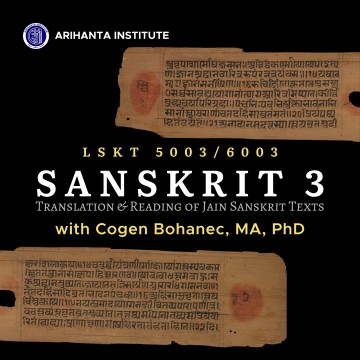Sanskrit 3: Translation & Reading of Jain Sanskrit Texts
Sanskrit 3: Translation & Reading of Jain Sanskrit Texts
 Fall 2025 (classes begin September 2, 2025 and end December 8, 2025)
Fall 2025 (classes begin September 2, 2025 and end December 8, 2025)Monday 9:30 - 10:55 a.m. / Friday 9:30 - 10:55 a.m. PT
Course LSKT50036003
This course is designed for students who have completed an introductory first-year course in Sanskrit and who are familiarized with the content of the Devavāṇīpraveśikā or an equivalent primer. Students will engage in the reading and translation of an important source from the Jain canon, along with its commentary. This course aims to deepen students' understanding of Sanskrit language and literature, as well as introduce them to the commentarial style and tradition. We may select specific texts that are relevant to students’ research and thus help students with their research in terms of translating primary sources.
Learning Objectives
- Develop advanced Sanskrit reading and translation skills.
- Analyze and interpret complex Sanskrit texts.
- Understand the commentarial style and tradition in Sanskrit literature with a particular focus on the Jain tradition, but also in conversation with Hindu and Buddhist traditions.
- Apply knowledge of Sanskrit grammar and syntax to translation.
- Discuss nuances of South Asian philosophy, theology, languages, literature, culture, etc.
- Assist and advise students regarding their research in terms of employment of translations of primary source texts.
Learning Area
 Jain Philosophy, History & Anthropology
Jain Philosophy, History & Anthropology Instructor
 Cogen Bohanec, MA, PhD
Cogen Bohanec, MA, PhD
Cogen Bohanec currently holds the position of Assistant Professor in Sanskrit and Jain Studies at Arihanta Institute where he teaches various courses on Jain philosophy and its applications. In addition, he is a Visiting Assistant Professor at Claremont School of Theology (CST) where he teaches Sanskrit and Gujarati, and he has taught numerous classes on South Asian Culture & Religions and Sanskrit language at the Graduate Theological Union (GTU) in Berkeley. Dr. Bohanec specializes in the Jain and Hindu traditions, comparative dharma traditions, philosophy of religion, theo-ethics (virtue ethics, and environmental and animal ethics in particular), and Sanskrit language and literature, and has numerous publications in those areas, particularly in the fields of Jain and Hindu Studies amongst other disciplines. He has a PhD in “Historical and Cultural Studies of Religion” with an emphasis in Hindu Studies from GTU, where his research emphasized ancient Indian languages, literature, and philosophical systems. He also holds an MA in Buddhist Studies from the Institute of Buddhist Studies at GTU where his research primarily involved translations of Pāli Buddhist scriptures in conversation with the philology of the Hindu Upaniṣads. He is the author of “Bhakti Ethics, Emotions and Love in Gauḍīya Vaiṣṇava Metaethics” (Lexington, 2024), an interdisciplinary study that frames traditional Hindu themes of ecotheology, ecofeminist theology, feminist care ethics, within a framework of virtue ethics in conversation with a bhakti-based psychology of emotions. Currently he is largely engaged in publication and research on various aspects of the Jain tradition, emphasizing translations and analyses of Jain Sanskrit, Prakrit, and Gujarati texts, but is also publishing academic works on various topics within the Hindu tradition.
Enrollment Options
14-DAY FREE TRIAL
- Free, unlimited access to our self-paced courses for 14-days.
- Already used your free trial? Enroll in our Monthly or Annual Membership options at anytime and continue learning immediately!
MONTHLY MEMBERSHIP
- $45 USD / Month
-
Immediate access to course
#### | Name. - Unlimited access to our live and self-paced courses for one month, with month-to-month auto rollover.
- Excludes graduate seminars, language courses, and courses hosted on partner platforms.

